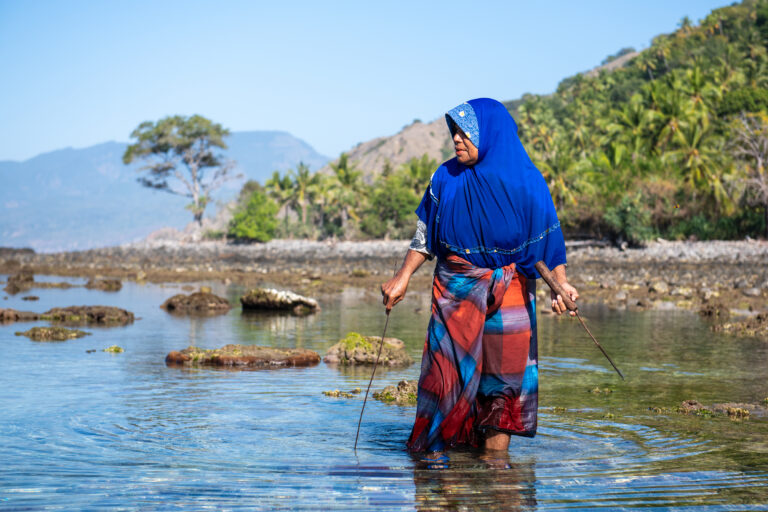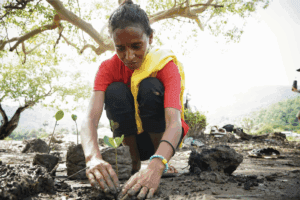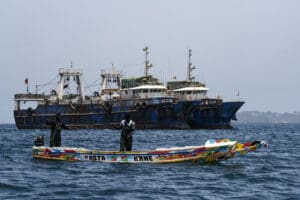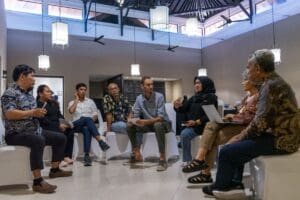Dr Alasdair Harris, Executive Director
Super cyclones, stunning sea surface temperatures, devastating droughts, the hottest year ever recorded, and a mega El Niño in the offing. These are just some of the mind boggling extremes that we have lived through in recent months.
This year’s tally of weather anomalies makes unusually grim reading. As I write this in Timor-Leste, the poorest country in Asia, the rainy season is months late; fields lie bare in withering heat. Across the Indo-Pacific in Madagascar, where Blue Ventures has supported communities for over two decades, record-breaking heatwaves and the longest lived tropical cyclone ever recorded have taken their toll. These events would have been virtually impossible without human-caused global heating. Reliant on rain-fed agriculture, both these countries grapple with food insecurity as a result of recurrent droughts, with Madagascar still recovering from its last famine. And the mercury is still rising: ocean temperatures in the southern hemisphere won’t peak until the new year as the summer months progress.
Across the world our colleagues and partners are witnessing weather systems in disarray. From as far afield as Guinea Bissau and Mindanao we see extremes: drought, rain, wind, supercharged storms and − everywhere − heat. Our organisation supports more than 800 communities in fifteen tropical coastal countries. Most of these countries are poor, and some are among the poorest on earth. Many of our partner communities report weather patterns that no one has experienced in living memory. Weather patterns which are disrupting species migrations and breeding seasons. Heat stress which is decimating entire ecosystems. Day in, day out we are bearing witness to the reality of life in uncharted climatic territory.
These extremes are typical of the reality faced by billions living across the tropics and subtropics. They have contributed very little to climate breakdown, both today and in the past. Their per capita emissions are a tiny fraction of my own in the UK.
Blue Ventures will be participating in COP28 to ensure that these experiences do not go unheard and unnoticed. We will be standing with community leaders from across the world to see to it that those with the power to turn the tide bear witness to the reality of life on the frontlines of the climate crisis. Our message to governments is threefold.
Firstly, communities experiencing the devastation of global heating are not passive bystanders to the climate emergency. In the case of oceans, they are frontline defenders with the local knowledge needed to adapt and build resilience. Our oceans can significantly buffer the worst impacts of climate change, absorbing human-induced carbon dioxide emissions and heat from the atmosphere. Coastal communities are best placed to develop so-called nature based solutions like mangrove carbon projects that can protect coastlines, bolster livelihoods and lock away vital blue carbon. And they are the only group that can mobilise at the global scale demanded by this planetary emergency.
Secondly, communities can only act if they have the legal rights and recognition to do so. Coastal communities rarely have legal rights to the waters they depend on. They are widely marginalised by unjust policies that favour more powerful and environmentally damaging sectors, like industrial fishing. Securing local tenure rights can be the catalyst we need to create movements of change: for example giving coastal fishers power to protect carbon-rich seagrass beds from bottom trawling, enabling a community to register a carbon project to restore a coastal mangrove forest, or giving a population legal rights to access compensation when their coral reef dies from heat stress. With secure tenure rights − to land, sea and carbon − communities can meaningfully protect themselves from this climate of growing instability.
Thirdly, while community-based climate action is far more affordable than other nature-based solutions, delivering it at a global scale will need wealthier nations who have historically been the largest emitters to dig deep to finance it properly. While the agreement to create a fund for addressing loss and damage was a welcome surprise at last year’s COP, we urgently need far greater clarity on how it will work, and how much funding richer countries will provide.
Donors must also play their part, by reimagining how aid reaches communities, breaking the stranglehold of inefficient development finance, and delivering cash to where it’s needed most. Progressive new funding mechanisms like our Frontline Community Fund are built to do just this — funding frontline community organisations flexibly and for the long term to restore marine life, boost catches and find ways to adapt.
This year’s climate talks convene in a city that owes its existence to the perverse profitability of the fossil carbon economy that has created this crisis. We need governments to confront the injustice of climate change unflinchingly, and redirect those profits to those who are already incurring an unacceptable cost.




















